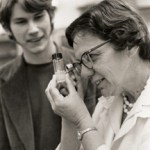
Why labeling of GMOs is actually bad for people and the environment « The Berkeley Blog.
This is a very balanced and knowledge-based post by the widely respected agricultural economist, David Zilberman. Thankfully, he brings some science to this hot topic. It is an important read for everyone in California who votes as we will soon have an initiative on GMO Labeling on our ballot.
One small point. Professor Zilberman indicates "Now, what about emergence of resistance to GMOs? '
Actually, the resistance is to the herbicide that is sprayed on the GMO. The more people plant…
It seems that plant biologists just cant take the misinformation about genetics any longer. First we had the moving and informative video from the Rothamsted Research Group and now an elqouent article from two professors from Swedish agricultural university. You can read their story here: ”Populistisk miljörörelse demoniserar gentekniken” - DN.SE.
Is the tide turning in Europe? Are consumers now able to more easily access knowledge-based information on genetically engineered crops? Can we finally move on from from talking about how the seed was made and instead focus on…
Conservation Remix was an event with a mission—to foster creative thinking about the big environmental issues of our time. The organizers aimed to broaden the definition of what it means to be “green”. For one thought-provoking day, innovators in diverse fields connected science, engineering, business, architecture, and design to peer ahead to a sustainable future. At Conservation Remix, last saturday in Seattle, we heard from inspiring, thoughtful, and remarkable people about ideas that can truly change the world.
Cassandra Profita and I were two of the many people Tweeting at …
Thai Youth Seek a Fortune Away From the Farm - NYTimes.com.
My most troublesome girl- always getting out of the coop and digging in my garden- shows up this morning with 16 baby chicks! Not such a goof-off afterall. Go girl.
A few years ago, Slate journalist Daniel Engber, wrote a provocative, and I think highly accurate, article describing the corporate strategy of "manufactured uncertainty" that was used for years to question the scientific consensus that cigarette smoking causes cancer. Similarly, he argues, some environmental activists use the same approach to challenge the scientific consensus that the GE crops currently on the market or safe to eat and beneficial for the environment. "If private industry can bewitch the government with contrarian science, so, too, can they. ..Doubt is their…
MT The debate on genetically engineered crops (the so-called "GMOs") has begun to grow up. Anti-GMO protests are fizzling.
Why?
Some consumers are embracing an emerging "geek consciousness" – a science-friendly approach that rejects unfounded attacks on basic and applied science and that emphasize knowledge-based agriculture instead of faith-based agriculture.
Also, genetic modification is no longer new. GM crops have been grown commercially around the world for more than a decade, and have been eaten by millions with no harm to human health or the environment. Scary health effects…
Is the U.S. National Science Foundation (NSF) turning down deserving research proposals because of potential biases in the grant-review process? The answer may be yes, if preliminary findings of an experiment being conducted by NSF officials holds up.
A recent study described in science magazine, cites one researcher who was ranked highly only by a set of reviewers only in the case where her name was withheld from them. She concludes: "The current system is definitely a 'a buddy system' where it's not what you know but who you know, where you work, and where you publish.…
Here is a link to a an interesting new book by Julia Gordon. She just graduated from Washington University in St Louis as a graphic design major, and for her senior thesis she designed an informational book, using the chapter "Green Genes" from Stewart Brand's book "Whole Earth Discipline". For this project she used his text as the body for the book, and created additional images, graphics, maps, captions and footnotes to accompany the text.
When given the assignment to design an informational book for her thesis, she was excited to base it on Green Genes because she found it "eye…
Listen to an informative interview on NPR with University of California, Berkeley geneticist Peggy Lemaux regarding the California initiative on Food labeling.
"If youre looking to know whats in your food, well theres a lot of stuff in your food, and theres already a lot of stuff on the label," says Lemeaux. "And a lot of people already dont read the label."
For more information, check out her science-based website here.
It is a great site, which answers just about any question concerning genetically engineered crops.
Just read some of the comments on Amy Harmon's #GMO labeling story from Friday's NYT. Guess people care about this topic.
Here are some excerpts:
"Unless you are foraging, eating wild-berries, game, etc... then you are consuming GMO food. There is no logical definition of #GMO food"
"Conservatives deny data on global warming; Liberals deny data on #GMO safety Each side discards reason when it doesn't suit their politics"
"The FDA should require stringent testing of GMO products and label only those found to be harmful"
"You think you have pesticides being applied now? Wait until the demise of…
A paper in this week's issue of Nature and a commentary on Revkin's DotEarth blog reinforces the argument that a hybrid path in agriculture -- incorporating both conventional and organic production practices -- gives the best chance of feeding some 9 billion people by midcentury in an ecologically-based manner.
The thoughtful and comprehensive study compares yields in organic and conventional systems and addresses the criticisms of an earlier study by Badgley et al (for problems with the earlier study, see the supplementary discussion in Seufert et al).
The organic agriculture movement has…
I was so pleased to have a chance to take part in the Women in Science Symposium at Cornell April 2-3.
Thanks to the Cornell faculty and students that put together this wonderful event. For those that could not attend, read the graduate student interviews with the speakers here.
Dr. Mary Power is director of the Angelo Coast Reserve, leader in scientific societies, mentor to many successful students, and as an influential figure in several environmental policy debates.
Dr. Sharon Long is member of National Academy of Sciences and served as science advisor to President Obama during his…
I am so looking forward to the talks tomorrow.
Linda Buck! Sharon Long! Mary-Claire King! and more...
Frontiers in the Life Sciences: a Symposium Celebrating Excellence
Bacteria can talk. Yes. Talk. These unicellular, primitive creatures have their own language. They secret chemical words to their environment, where their neighbors can listen, comprehend and react to those messages.
This bacterial communication is called quorum sensing (QS).
Although the first discoveries in the field of bacterial communication where made more than 40 years ago in the marine bacterium Vibrio fisheri (1), they simply did not have the quorum to be heard. Until Bonnie Bassler came along.
Thanks to Bonnie and her colleagues, today, microbiology courses throughout the world…
The New Earth Archive is a resource network of powerful, inspiring books on climate change, sustainability, social justice, and human nature.The students ask you to vote for up to 15 of your favorite books.
So pleased, Tomorrow's Table made the list!
http://www.surveygizmo.com/s3/808430/neweartharchive-ballot
Whoie Earth Discipline, by Stewart Brand is also on the list and so are many other great books.
Please spread the word. Thanks for your support.
The New Earth Archive was developed by students at the New Jersey Institute of Technology, and supported by Paul Hawken and other leading…
Applause for Plant Physiologist Helen Stafford who left the Reed College Biology Department $1M. As a woman scientist in the 1950s, Stafford was ineligible for many jobs. Reed College, not deterred by her sex, offered her a position. She went on to establish a successful career and inspired many young scientists. Here is a short story of how she influenced my career.
The windowless room, dank an dark, was not an obvious place for inspiration. I took notes, wondering if I would be able to glean anything meaningful from Professor Helen Stafford's (1922-2011) meandering lecture. I was skeptical…
Applause for Plant Physiologist Helen Stafford who bequeathed an astonishing $8M to Reed College in her will. As a woman scientist in the 1950s, Stafford was ineligible for many jobs. Reed College, not deterred by her sex, offered her a position. She went on to establish a successful career and inspired many young scientists. Here is a short story of how she influenced my career.
The windowless room, dank an dark, was not an obvious place for inspiration. I took notes, wondering if I would be able to glean anything meaningful from Professor Helen Stafford's (1922-2011) meandering lecture. I…
"Nothing more fun than making discoveries in nature and then seeing them used for the public good "
Listen to the NPR interview with enthusiastic Professor Emeritus Murray Gardener.
He describes recent UCDavis symposium with 2011 Nobel Laureates Bruce Beutler and Jules Hoffman
The University of California, Davis, will host two Nobel laureates for a symposium this month about the shared characteristics of plants, flies and people in terms of how they fight infections.
"Evolution of Common Molecular Pathways Underlying Innate Immunity" will feature the 2011 Nobel Laureates in Physiology or Medicine, Jules Hoffmann of the University of Strasbourg, France, and Bruce Beutler of the University of Texas Southwestern Medical Center, Dallas. Luke O'Neill, professor of biochemistry and immunology at Trinity College, Dublin and I will also give lectures.
The symposium is…

